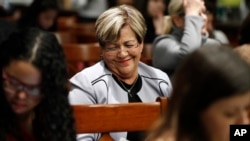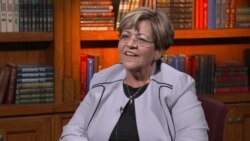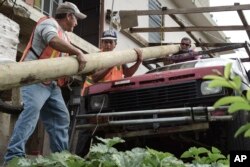A leading Puerto Rican official is appealing for the U.S. government to quickly come through with financial aid promised after twin hurricanes devastated the island last summer and fall.
"The money has to go to Puerto Rico as soon as possible," says Maria Eloisa Melendez Altieri, mayor of the seaside resort city of Ponce, during a visit to Washington. She said in an interview with VOA on Thursday that the island's recovery effort has hobbled because of an "economic crisis from years ago."
Melendez Altieri, nicknamed "Mayita," said much of her city has the power that many other communities in Puerto Rico still lack, six months after the hurricanes devastated the island's power grid. But outside the city center, she said, power is still a precious commodity.
"I have 95 percent of electricity in the urban areas," she said. "But the rural areas -- I have more than 40 communities without electricity or power."
WATCH: Puerto Rican Mayor Urges US to Rush Development Aid it Promised
Funds needed ASAP
As if to underline her point, two major power plants shut down Thursday in the Puerto Rico capital, San Juan, exposing the continuing fragility of the system. Power was restored to the island's international airport and several hospitals by Thursday afternoon but some 970,000 people live in the areas where the blackout occurred.
Melendez Altieri urged that the government authorities in charge of restoring power to the U.S. territory speed their work to restore power to the rest of Puerto Rico.
Hurricanes Irma and Maria hit in August and September last year, she said, Ponce got about 2,000 visitors every weekend, from Thursday to Saturday, as Puerto Ricans came to enjoy the beach and the city's cultural offerings. Now, she says, Ponce sees as many as 12,000 visitors in a weekend -- because it has power. "We keep doing business," she said.
Much of Puerto Rico has been without power since Hurricanes Irma and Maria devastated the island last August and September.
As for the rapidly approaching 2018 hurricane season, which starts June 1, the mayor says her city officials are getting ready, and she is recommending to other Puerto Rican mayors to do the same.
Abrupt reduction
Her visit to the nation’s capital follows a tumultuous week for Puerto Rico. Governor Ricardo Rossello announced earlier this week that the U.S. Treasury Department has abruptly cut a $4.7 billion disaster relief loan to Puerto Rico by more than half. Rossello is appealing to Congress for help.
In a nine-page letter to lawmakers sent Monday, Rossello warned that the “misguided delay and policy decisions contrary to congressional intent” could mean shutdowns in the near future. He said restrictions imposed on Puerto Rico’s ability to obtain the funds were “seemingly designed to make it extremely difficult for Puerto Rico to access these funds when it needs federal assistance the most.”
He also noted in the letter that the Treasury Department has made clear it does not plan to forgive the loan, as it has done with a number of community disaster loans in the past.
Rossello said the Treasury did not provide an explanation for the reduction of the loan amount, which had been approved by Congress five months ago. He said the cut will put Puerto Rico in “a dangerous financial dilemma” and warned that his administration may have to cut some essential services to cope with the loss of funds.
He also warned that the loss of services will only persuade more Puerto Ricans to flee the island for the mainland United States. That, he said would only exacerbate Puerto Rico’s financial troubles.
Tens of thousands of Puerto Ricans have left the island for the mainland, where as U.S. citizens, they may settle anywhere they like and vote in U.S. elections.
In January, U.S. Treasury officials and FEMA sent Puerto Rico government authorities a letter saying they were temporarily withholding the loan because they did not believe the government was facing a financial shortage. Officials said the money would be disbursed through the Community Disaster Loan Program after Puerto Rico’s central cash balance decreased to a certain level.







